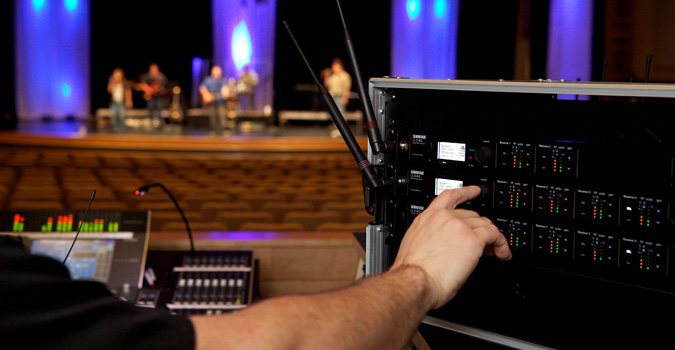How You Can Improve The Technical Quality Of Your Worship Service
We live in a technical age. Many churches make the assumption that having the right gear is what this is all about.
But having the right gear won’t help unless we have the right people in the right positions.
This blog isn’t about how to run sound. It’s not about how to run lights. It’s about how to put the right team together that will help you with the things that are technical in your worship service.
The problem I see today is that often times we overload one person with what should be a multi-volunteer system. I talked to countless churches who have one person who’s running sound, managing video, and paying attention to the lights. That’s just too much to put on one person. We want to help with that. The solution is to put together a production team. It’s basically just a team of people who are going to help tackle all these different areas we’re talking about. You don’t have to hire a bunch of people. Don’t let that scare you. That’s not what this is about. You need to actually bring in volunteers who will give their time and expertise in each area to help you do exactly what you need them to do in your environment on Sunday morning, Saturday night, or whenever you have your service.
Now, before we can put together a team of people, it’s important that we talk about the quality traits that we want in people on our technical team. This is huge because we filter everything through these qualities.
What we don’t want, right off the bat, is a territorial tech person. If you’re a tech person, thank you so much for serving, but one of the things I’ve noticed is that technical people (even musicians) can often become territorial with our area of expertise. We don’t want anyone to tell us what to do. We’re like, “Don’t get near my gear!” That is poison in the well of the volunteer team you want to put together.
These are four qualities we want from people on our team.
- Servant hearted. This attitude is always better than trying to “own” your area. Why? Because the Savior that we’re following—He served. That’s the model He set for us.
- Open handed. An open handed team doesn’t hold too tightly to any area that they’re working in. They’re willing to let people give ideas, and they’re willing to offer ideas to help other team members.
- Teachable. None of us can ever stop learning. If you’re thinking about bringing someone on the team and they’re not teachable, that’s a red flag. We always want to be growing in our area of expertise.
- We want people who are on time. I can’t stress this enough. Sunday mornings come fast. People are showing up. There’s a deadline. You have to have people who are going to show up on time.
With that in mind, let’s focus on one role at a time. These may be new for you if you’ve never thought about the idea of putting a technical team together. But remember, these are great volunteer roles.
-
Production Director. A production director pays attention to the entire technical experience.
A production directors is a lot like the offensive coordinator of a football team who sits up in the top booth, and can see the entire field (the entire service), and knows what plays to call. They know how to fit pieces together. They know when lights need to come on, when sound needs to come, what level it needs to be, and how all the pieces interact well together. Even if they don’t know how to technically operate every aspect of your service, they need to be knowledgeable about them.
They must know how to lead a team well. It does no good to have a production director on your team who isn’t servant hearted, open handed, or any of the other qualities we looked at earlier.
-
Audio/Sound Engineer.
For me, this one hits a sore spot because, as a worship leader who’s played in bands at churches my whole life, it’s a big deal. I believe that the audio engineer is the most important person in the room. Without question, the pastor and what the pastor says is important! But other than the Holy Spirit, the Pastor and the front of house engineer are the most important people when it comes to putting together a worship service. Why? Because every moment of time that you invest in preparing exactly what’s going to happen in your worship service goes through a pipeline of audio for people to hear. Worship team, you can rehearse all you want, but if the sound engineer doesn’t mix the song the way it needs to be mixed, it’s not going to impact hearts and move people the way that it needs to.
If you’re not moving air, you’re not moving hearts.
What this means is that PA’s (sound systems) are designed to move air. When they’re set up right, tuned right, and songs are mixed right, people’s hearts are moved. It just feels right. In the audio realm, and I want to talk to you pastors right now if you’re watching. Often pastors buck up against the idea of audio. It’s like, “Hey, we’ve got a PA system, and it’s working great.” That’s a false assumption from a leadership perspective. I believe that most churches have a mismatched PA system with the room they’re in. What happens when you don’t have a sufficient PA for your space? We often hear, “It’s too loud. Can you turn the music down?” But it’s usually not because the music is too loud. Too loud really means frequencies are hurting our ears. That’s the sound engineer’s issue. You want an engineer who’s a servant, but who’s also skilled in knowing how to mix sound, what speakers to put in, and how to maximize your existing system so that frequencies aren’t hurting people’s ears. That’s a massive take-away for us today.
-
Lighting Director.
This is your next volunteer position. And again, it’s a big deal. Lightning helps set the mood for the room and songs. You’d be amazed at how much lighting affects the feel. Even as people walk into your church, decide what you want people to feel. Do you need to dim the lights a little bit to give more of a warm feel, or do you want it to be bright so everybody can see each other and talk? Find the right person who is skilled and has a passion for lighting and creating moods.
Less is more when it comes to light. I’m not going to go into how to run lights in this module. But flashing, spinning lights that go crazy all the time—that’s not the right approach. We want subtle, simple, less-is-more scenes that create mood, but aren’t distracting or overboard.
-
Video Director.
You might say, “Why do we need a video director?” Video is a big deal these days. People watch videos on their phones, they watch TV, and they go to the movies. We’re a video-consumed society. We need to stay with culture because we’re trying to reach people in this culture. We need to make sure quality doesn’t take away from the experience. I sometimes hear, “The church down the street has video screens. We need to have video screens.” Video screens are great, but if the camera you’re using to shoot the experience isn’t good (by the way, the new iPhones shoot great quality videos), sometimes you’d be better off to not show videos, and just use the screens for lyrics for your worship songs. Make sure video adds to people’s experience, but doesn’t take away from it.
Another way you can use video is pre-service video. This is huge because one of the things I’ve seen over and over is people effectively using video as a way to do pre-service announcements. It’s great because you can control the announcements and the look and feel. It’s a simple thing to play as people walk in so they can be engaged before anyone even walks on stage.
The other great way to use video is in baptism testimonies. I can’t tell you how many times lives in our church have been impacted by someone taking the time to shoot a video of their story. It’s played right before we baptize someone. It reaches people in your room like nothing else. Video is great because you can control the length of it.
-
Lyrics/Pro Presenter.
You need a way to run lyrics for a song. As a worship leader, I feel like the volunteer running song lyrics is a second worship leader. If the people in your room can’t see the lyrics to the songs, and they’re not done in a timely fashion, then people get left behind. I’ll say it again: the volunteer running song lyrics is another worship leader. They must know the songs well and be able to lead the audience. So if you’re looking to get a volunteer involved to run lyrics, or you have one right now, please make sure they know your songs. Make sure they have the set list ahead of time. Make sure they’re listening to the songs you’re about to do this Sunday so they’re well acquainted with verses and choruses.
To close this session, I want to talk about three things you can do this week to improve your technical experience. These are super practical and every church can do them, but they are commonly missed in worship services
-
Clean the clutter.
I can’t tell you how many times I walk into a church and see mic stands on stage, cables everywhere, water bottles, leftover chord charts, and music stands. It’s all sitting there on stage. That communicates disorganization as people come in your room. Clean up the stage. You might ask, “What do we do if we need those things?” You empower a small team of volunteers. It could be two people. That’s typically all it takes to clear the stage when the music time is over. When your pastor gets up to speak, you have a clean stage. Pay attention to that. A clean stage communicates order. It communicates professionalism to the people who you want to attract to your church.
-
Plan your playlist.
Just like it’s important to have the right lighting when people walk in your room, it’s important to have music playing. Many of you are already doing this. But if you don’t, that’s why I want to mention it. There are so many greta tools designed to help you put together a playlist of songs that create the feel you want as you draw people in. Spotify is a personal favorite. Think about your playlist and talk about it as a team. What kind of feel do we want? Being intentional to have music playing when people enter and leave your room builds anticipation and excitement. Also, pay attention to the music that’s being played as soon as the last person on stage says, “Thanks for coming. We’ll see you next week.” You want to have music ready immediately because it communicates, “The service is over. It was great to have you. You’re dismissed.”
-
Close the gap.
This is huge. Begin to build a relationship with the platform team. Once you’ve prayed for, looked for, and assembled the right volunteer technical team, there’s often a chasm between the people who are on the platform and the people who are serving them with technical support. In my heart, there’s an issue here. What I would do is encourage you to build a relationship with the platform team. Circle up to talk through the service and pray together. You have no idea what a simple circle time on Sunday, with all members of the technical team and the platform team, can do for your church.



